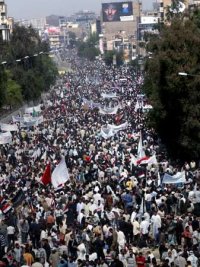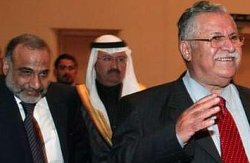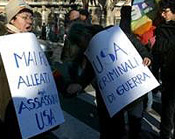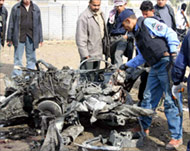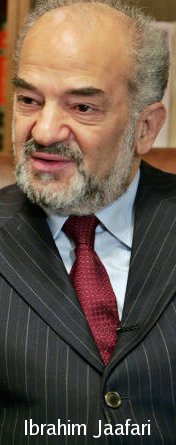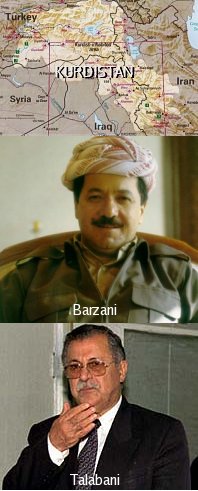Feature Archives
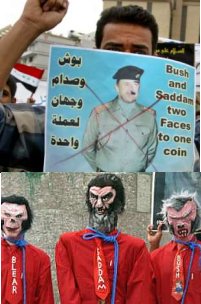 On April 9th 2005,
tens of thousands of protesters marched through Baghdad denouncing the US occupation of Iraq, chanting anti-Western slogans such as "No, no to the occupiers", and "No America! No Saddam! Yes to Islam!".
Shia cleric Moqtada Sadr had called for the mass rally to mark the second anniversary of the fall of Baghdad demanding both an end to the US occupation and that Saddam Hussein be brought to trial. Following the march, demonstrators, many loyal to Shia cleric Moqtada Sadr, rallied in Firdos Square where the ousted Iraqi leader's statue was toppled in 2003.
On April 9th 2005,
tens of thousands of protesters marched through Baghdad denouncing the US occupation of Iraq, chanting anti-Western slogans such as "No, no to the occupiers", and "No America! No Saddam! Yes to Islam!".
Shia cleric Moqtada Sadr had called for the mass rally to mark the second anniversary of the fall of Baghdad demanding both an end to the US occupation and that Saddam Hussein be brought to trial. Following the march, demonstrators, many loyal to Shia cleric Moqtada Sadr, rallied in Firdos Square where the ousted Iraqi leader's statue was toppled in 2003."Thousands of Sunnis gathered in downtown Ramadi to protest, as well. The Association of Muslim Scholars declined to have their Sunni Arab followers join the Shiites at Firdos Square, which points to continued sharp ethnic divisions that have made it difficult for Iraqi nationalists to unite against the American presence."
Read More | Mahdi Army still a Factor | U.S., Iraqi Troops Battle Dozens of Insurgents | Prisoners riot at US-run camp in southern Iraq | Iraqi Schools Hit by Intimidation Campaign | Attacks on Abu Ghraib highlight continuing Iraqi armed resistance
Thu Mar 24 2005
Iraq's Government Slow To Take Form
4/7/2005:
Ibrahim Jaafari has been named prime minister.
4/6/2005: Iraq's parliament has chosen Jalal Talabani as the country's new president. Both Adil Abdel-Mahdi and Ghazi Al-Yawar have been named as vice presidents.
Talabani: Ally of CIA, Iranian Intelligence and Saddam Hussein | Wikipedia: Jalal Talabani | Washington's Trojan Horse in the New Iraqi Government: Vice President Abdel Mahdi | Iraq ends deadlock
4/3/2005: Iraq's new parliament has elected Sunni Arab candidate Hajim al-Hasani as speaker, ending a political row over who will get the post and making a first step towards forming a government.
Speaker of Parliament Elected amid Rancor | Sunni speaker nominee slams rejection | Iraq Sunnis nominate Mishaan al-Jiburi | Iraqi puppet parliament adjourns in disarray | Power-sharing deal on hold | Struggles over power sharing
3/24/2005: The leading candidate to become the next Prime Minister of Iraq, Ibrahim Al-Ja’afari, is under pressure from leading Shia to withdraw because of his slow progress forming a new government. Negotiations continue to drag on partly because Ja’afari is struggling to deal with Kurdish demands for greater autonomy and a general resistance to the possible imposition of Islamic law. Despite fundamental differences between many Kurdish and Shia groups, some details of Iraq's future government are starting to emerge. Aside from appointing the Prime Minsiter, Shias are expected to be put in charge of the interior and finance ministries, and will fill the cabinet post of national security adviser. The Kurds will most likely get to appoint Jalal Talabani as president and receive seven to eight ministries, including the foreign ministry and oil. The speaker of parliament is expected to be a Sunni Arab, possibly the current interim president, Sheikh Gazi al-Yawar. Many Sunni leaders are weary about the proposed federalist structure for Iraq , warning this only plays into the hands of the occupation by contributing to slice the country and that calls for federalism 'only serve the interests of the occupation and fuel sectarian strife by pitting Iraqis against one another'.
4/6/2005: Iraq's parliament has chosen Jalal Talabani as the country's new president. Both Adil Abdel-Mahdi and Ghazi Al-Yawar have been named as vice presidents.
Talabani: Ally of CIA, Iranian Intelligence and Saddam Hussein | Wikipedia: Jalal Talabani | Washington's Trojan Horse in the New Iraqi Government: Vice President Abdel Mahdi | Iraq ends deadlock
4/3/2005: Iraq's new parliament has elected Sunni Arab candidate Hajim al-Hasani as speaker, ending a political row over who will get the post and making a first step towards forming a government.
Speaker of Parliament Elected amid Rancor | Sunni speaker nominee slams rejection | Iraq Sunnis nominate Mishaan al-Jiburi | Iraqi puppet parliament adjourns in disarray | Power-sharing deal on hold | Struggles over power sharing
3/24/2005: The leading candidate to become the next Prime Minister of Iraq, Ibrahim Al-Ja’afari, is under pressure from leading Shia to withdraw because of his slow progress forming a new government. Negotiations continue to drag on partly because Ja’afari is struggling to deal with Kurdish demands for greater autonomy and a general resistance to the possible imposition of Islamic law. Despite fundamental differences between many Kurdish and Shia groups, some details of Iraq's future government are starting to emerge. Aside from appointing the Prime Minsiter, Shias are expected to be put in charge of the interior and finance ministries, and will fill the cabinet post of national security adviser. The Kurds will most likely get to appoint Jalal Talabani as president and receive seven to eight ministries, including the foreign ministry and oil. The speaker of parliament is expected to be a Sunni Arab, possibly the current interim president, Sheikh Gazi al-Yawar. Many Sunni leaders are weary about the proposed federalist structure for Iraq , warning this only plays into the hands of the occupation by contributing to slice the country and that calls for federalism 'only serve the interests of the occupation and fuel sectarian strife by pitting Iraqis against one another'.
Sun Mar 6 2005
US Fires On Car Carrying Italian Journalist
On Friday March 4th 2005, American troops fired on a car rushing Italian journalist Giuliana Sgrena to freedom after a month in captivity, wounding her and killing the Italian intelligence officer who helped negotiate her release. On February 4th, Giuliana, who was working for the Italian newspaper Il Manifesto, was kidnapped in Baghdad and on February 15th, she appeared on a videotape begging for her life and for Italian troops to leave Iraq. While the US claimed that they fired on the car because it was speeding towards a checkpoint, Giuliana Sgrena has said that they were past the last checkpoint and the US shooting was most likely intentional and intended to discourage others from negotiating to free hostages.Some 190 foreigners have been kidnapped in Iraq in the past year but the number of Iraqis seized is far greater. Hotels in Jordan are thronged with middle-class Iraqis who have fled in fear of being kidnapped.
Giuliana Sgrena: My truth | Italians, Shame On You | Democracy Now: Il Manifesto Founder on Sgrena Shooting | World Socialist Web Site | Companion of Freed Italian Journalist Says U.S. Attack Was Deliberate | No One Safe on Baghdad's Roads, Iraqis Say | Bulgaria Says Soldier Killed by U.S. Troops in Iraq | Italia.Indymedia.Org | Il Manifesto
Giuliana Sgrena: My truth | Italians, Shame On You | Democracy Now: Il Manifesto Founder on Sgrena Shooting | World Socialist Web Site | Companion of Freed Italian Journalist Says U.S. Attack Was Deliberate | No One Safe on Baghdad's Roads, Iraqis Say | Bulgaria Says Soldier Killed by U.S. Troops in Iraq | Italia.Indymedia.Org | Il Manifesto
3/10/2005:
At least 47 people have been killed and more than 90 wounded in an explosion at a Shia funeral service in the northern Iraqi city of Mosul, witnesses and hospital officials said.
Gunmen have shot dead the chief of a central Baghdad police station and at least two other policemen during an ambush.
2/28/2005: "A suicide bomber steered a sedan full of explosives into a thick crowd of Iraqi police and army recruits here on Monday morning, killing at least 122, Iraqi officials said, in the deadliest single bombing since the American invasion nearly two years ago." Read More
2/18/2005: Blasts hit a Shiite mosque in the Iraqi capital Friday killing dozens. February 19th 2005 is Ashurah, the holiest day of the year for Shiites. Many Shiites make pilgrimages on Ashurah to the the shrine of Husayn in Karbala, Iraq. During last year's Ashurah pilgrimages, twin blasts ripped through crowds of worshipers at Shiite Muslim shrines in Baghdad and Karbala, killing at least 181 people.
Despite a brief lull right after the Iraqi elections, assassinations, bombings, mass killing of Iraqi troops and kidnappings have continued and things look likely to get worse as the Sunni minority becomes increasingly marginalized from power and Kurds start to demand independence.
Anger at the US occupation is intensifying as more reports of US atrocities in Falluja surface and US army reports are released detailing the murder of Iraqi prisoners in US custody. The disrespect of Iraqis by US troops extends to US soldiers who have returned home and posted pictures of mutilated Iraqi bodies with dehumanizing captions.
2/28/2005: "A suicide bomber steered a sedan full of explosives into a thick crowd of Iraqi police and army recruits here on Monday morning, killing at least 122, Iraqi officials said, in the deadliest single bombing since the American invasion nearly two years ago." Read More
2/18/2005: Blasts hit a Shiite mosque in the Iraqi capital Friday killing dozens. February 19th 2005 is Ashurah, the holiest day of the year for Shiites. Many Shiites make pilgrimages on Ashurah to the the shrine of Husayn in Karbala, Iraq. During last year's Ashurah pilgrimages, twin blasts ripped through crowds of worshipers at Shiite Muslim shrines in Baghdad and Karbala, killing at least 181 people.
Despite a brief lull right after the Iraqi elections, assassinations, bombings, mass killing of Iraqi troops and kidnappings have continued and things look likely to get worse as the Sunni minority becomes increasingly marginalized from power and Kurds start to demand independence.
Anger at the US occupation is intensifying as more reports of US atrocities in Falluja surface and US army reports are released detailing the murder of Iraqi prisoners in US custody. The disrespect of Iraqis by US troops extends to US soldiers who have returned home and posted pictures of mutilated Iraqi bodies with dehumanizing captions.
Ibraheim Al-Jaafari, the head of the pro-Iran Da’awa party gave an interview the other day. He tried very hard to pretend he was open-minded and that he wasn’t going to turn the once-secular Iraq into a fundamentalist Shia state but the fact of the matter remains that he is the head of the Da’awa party. The same party that was responsible for some of the most infamous explosions and assassinations in Iraq during the last few decades. This is the same party that calls for an Islamic Republic modeled like Iran. Most of its members have spent a substantial amount of time in Iran.
Jaffari cannot separate himself from the ideology of his party.
Then there’s Abdul Aziz Al-Hakim, head of the Supreme Council for the Islamic Revolution in Iraq (SCIRI). He got to be puppet president for the month of December and what was the first thing he did? He decided overburdened, indebted Iraq owed Iran 100 billion dollars. What was the second thing he did? He tried to have the “personal status” laws that protect individuals (and especially women) eradicated.
Riverbend from her blog Baghdad Burning
2/15/2004: The United Iraqi Alliance has agreed on Vice President Ibrahim Jaafari as its candidate for Prime Minister. Jaafari wants to bring Muqtada al-Sadr into the new government, but he is on record opposing the establishment of timetable for a US military withdrawal from Iraq. Adil Abdul Mahdi, the interim finance minister and representative of the Supreme Council for Islamic Revolution in Iraq, has withdrawn his name for consideration as prime minister. Abdul Mahdi's candidacy may have been damaged by his close working relationship with the Americans and his advocacy of privatizing the petroleum industry.
Jaafari: "Islam to be Source of Legislation" | Jaafari Takes lead | Iraqi groups demand US exit
2/14/2004: The United Iraqi Alliance (UIA) has won a majority (140 seats) after adjustments were made in accordance with electoral procedure. The UIA still needs a 2/3s majority, and therefore a coalition partner or partners, to form a government (which involves electing a president and two vice-presidents, who will appoint a prime minister). But it can now win votes on procedure and legislation without needing any other partner. Read More...
2/13/2005: Iraq's election results have been announced, but Iraq's future remains unclear. It appears that Iraqis have voted overwhelmingly to throw out the US-installed Ayad Allawi and a near majority have voted for the United Iraqi Alliance (UIA). The second plank in the UIA platform called for "a timetable for the withdrawal of the multinational forces from Iraq", but as with the UIA's other pledges to expand the public sector, keep the oil and drop the debt, this promise is unlikely to be kept if the US has its way and Iraq's current finance minister Adel Abdul al-Mahdi is chosen by the UIA to lead Iraq.
Election results were as follows:
8.55 million Iraqis, or 47% of eligible voters (58% of registered voters), cast ballots (including several hundred thousand voting from abroad).
The United Iraqi Alliance won 140 seats with more than 4 million votes, or about 48 percent of the total cast. The UIA's support was drawn largely from the Shiite political establishment and tacitly endorsed by Grand Ayatollah Ali al-Sistani. The UIA was headed by Abdel-Aziz al-Hakim, the cleric who heads Iraq's largest political group, the Shiite Supreme Council for the Islamic Revolution in Iraq (SCIRI). While al-Hakim headed the ticket, Adel Abdul al-Mahdi and Ibrahim al-Jaafari are seen by some as the most likely alliance members to be chosen as Prime Minister. The UIA included SCIRI, and the Islamic Dawa Party as well as Ahmed Chalabi's Iraqi National Congress (INC) and the Hezbollah Movement in Iraq.
The Kurdish Alliance List won 75 seats with 2.175 million votes, or 26 percent. Among the Kurdish Alliance List's 165 candidates's were the Kurdistan Democratic Party leader Massoud Barzani and the Patriotic Union of Kurdistan leader Jalal Talabani.
The Iraqi List won 40 seats with 1.168 million votes, or 13.8 percent of the total. The Iraqi List was lead by interim Prime Minister Ayad Allawi and his Iraqi National Accord party and included a mix of Shiites and Sunnis (but Shiites accounted for the majority of top names).
The Iraqis Party won 5 seats with 150,000 votes, or less than 2 percent. The Iraqi Party was led by interim President Ghazi al-Yawer and favored by some Sunnis who agreed with al-Yawer's opposition to U.S. attacks aimed at wiping out insurgents in the hotbed cities of Fallujah and Mosul.
The Assembly Of Independent Democrats won no seats with only 12,000 votes, or 0.1 percent. It ran 78 candidates and was led by the Sunni leader Adnan Pachachi. The Assembly Of Independent Democrats had been expected to fare well among intellectuals and the urban middle class. Before last year, Pachachi had been widely thought to be the most likely future Sunni leader of Iraq.
Other Parties: The Turkomen Iraqi Front (representing the country's ethnic Turks) got 3 seats with 93,480 votes, the National Independent Elites and Cadres Party got 3 seats with 69,938 votes, the Communist Party got 2 seats with 69,920 votes, the Islamic Kurdish Society got 2 seats with 60,592 votes, the Islamic Labor Movement got 2 seats with 43,205 votes, the National Democratic Alliance got one seat with 36,795 votes, the National Rafidain List (Assyrian Christians) got 1 seat with 36,255 votes, and the Reconciliation and Liberation Entity got 1 seat with 30,796 votes.
"Only 2 per cent of eligible Iraqis in the Sunni Arab-dominated Anbar province voted in Iraq's elections, and only 29 per cent in the mainly Sunni Salahadin province, the final tally released on Sunday showed. In Nineveh province, which has many Sunni Arabs as well as Kurds, turnout was 17 per cent. The figures showed that only 3,803 people voted in the whole of Anbar province. The low turnout in Sunni provinces showed that many Sunni Arabs boycotted the election or stayed away out of fear, which could worsen sectarian tension in Iraq and fuel the insurgency which is mainly waged by Sunni Arab guerrillas. If Sunnis are shut out of Iraq's next government, they could potentially veto a new constitution due to be drawn up this year, causing political deadlock."
In Kirkuk, The Kirkuk Brotherhood list of the two main Kurdish parties (the PUK and the KDP) -- won 58.4 percent of votes, or 237,303 out of 405,951 ballots cast. Turkey has urged Iraqi electoral officials and the UN to examine what it claims are skewed Iraqi elections results in Kirkuk. Iraq's Turkmen minority demonstrated in central Baghdad Sunday to protest alleged electoral fraud in the disputed northern oil city of Kirkuk during last month's historic election. The Kurds want Kirkuk to be added to the three autonomous provinces of Iraqi Kurdistan.
Sorry George, but Iraq has given you the purple finger | Shiites, Kurds, win Big: Bush Loses Election in Iraq | Khalid Jarrar On The Election
Jaffari cannot separate himself from the ideology of his party.
Then there’s Abdul Aziz Al-Hakim, head of the Supreme Council for the Islamic Revolution in Iraq (SCIRI). He got to be puppet president for the month of December and what was the first thing he did? He decided overburdened, indebted Iraq owed Iran 100 billion dollars. What was the second thing he did? He tried to have the “personal status” laws that protect individuals (and especially women) eradicated.
Riverbend from her blog Baghdad Burning
2/15/2004: The United Iraqi Alliance has agreed on Vice President Ibrahim Jaafari as its candidate for Prime Minister. Jaafari wants to bring Muqtada al-Sadr into the new government, but he is on record opposing the establishment of timetable for a US military withdrawal from Iraq. Adil Abdul Mahdi, the interim finance minister and representative of the Supreme Council for Islamic Revolution in Iraq, has withdrawn his name for consideration as prime minister. Abdul Mahdi's candidacy may have been damaged by his close working relationship with the Americans and his advocacy of privatizing the petroleum industry.
Jaafari: "Islam to be Source of Legislation" | Jaafari Takes lead | Iraqi groups demand US exit
2/14/2004: The United Iraqi Alliance (UIA) has won a majority (140 seats) after adjustments were made in accordance with electoral procedure. The UIA still needs a 2/3s majority, and therefore a coalition partner or partners, to form a government (which involves electing a president and two vice-presidents, who will appoint a prime minister). But it can now win votes on procedure and legislation without needing any other partner. Read More...
2/13/2005: Iraq's election results have been announced, but Iraq's future remains unclear. It appears that Iraqis have voted overwhelmingly to throw out the US-installed Ayad Allawi and a near majority have voted for the United Iraqi Alliance (UIA). The second plank in the UIA platform called for "a timetable for the withdrawal of the multinational forces from Iraq", but as with the UIA's other pledges to expand the public sector, keep the oil and drop the debt, this promise is unlikely to be kept if the US has its way and Iraq's current finance minister Adel Abdul al-Mahdi is chosen by the UIA to lead Iraq.
Election results were as follows:
8.55 million Iraqis, or 47% of eligible voters (58% of registered voters), cast ballots (including several hundred thousand voting from abroad).
The United Iraqi Alliance won 140 seats with more than 4 million votes, or about 48 percent of the total cast. The UIA's support was drawn largely from the Shiite political establishment and tacitly endorsed by Grand Ayatollah Ali al-Sistani. The UIA was headed by Abdel-Aziz al-Hakim, the cleric who heads Iraq's largest political group, the Shiite Supreme Council for the Islamic Revolution in Iraq (SCIRI). While al-Hakim headed the ticket, Adel Abdul al-Mahdi and Ibrahim al-Jaafari are seen by some as the most likely alliance members to be chosen as Prime Minister. The UIA included SCIRI, and the Islamic Dawa Party as well as Ahmed Chalabi's Iraqi National Congress (INC) and the Hezbollah Movement in Iraq.
The Kurdish Alliance List won 75 seats with 2.175 million votes, or 26 percent. Among the Kurdish Alliance List's 165 candidates's were the Kurdistan Democratic Party leader Massoud Barzani and the Patriotic Union of Kurdistan leader Jalal Talabani.
The Iraqi List won 40 seats with 1.168 million votes, or 13.8 percent of the total. The Iraqi List was lead by interim Prime Minister Ayad Allawi and his Iraqi National Accord party and included a mix of Shiites and Sunnis (but Shiites accounted for the majority of top names).
The Iraqis Party won 5 seats with 150,000 votes, or less than 2 percent. The Iraqi Party was led by interim President Ghazi al-Yawer and favored by some Sunnis who agreed with al-Yawer's opposition to U.S. attacks aimed at wiping out insurgents in the hotbed cities of Fallujah and Mosul.
The Assembly Of Independent Democrats won no seats with only 12,000 votes, or 0.1 percent. It ran 78 candidates and was led by the Sunni leader Adnan Pachachi. The Assembly Of Independent Democrats had been expected to fare well among intellectuals and the urban middle class. Before last year, Pachachi had been widely thought to be the most likely future Sunni leader of Iraq.
Other Parties: The Turkomen Iraqi Front (representing the country's ethnic Turks) got 3 seats with 93,480 votes, the National Independent Elites and Cadres Party got 3 seats with 69,938 votes, the Communist Party got 2 seats with 69,920 votes, the Islamic Kurdish Society got 2 seats with 60,592 votes, the Islamic Labor Movement got 2 seats with 43,205 votes, the National Democratic Alliance got one seat with 36,795 votes, the National Rafidain List (Assyrian Christians) got 1 seat with 36,255 votes, and the Reconciliation and Liberation Entity got 1 seat with 30,796 votes.
"Only 2 per cent of eligible Iraqis in the Sunni Arab-dominated Anbar province voted in Iraq's elections, and only 29 per cent in the mainly Sunni Salahadin province, the final tally released on Sunday showed. In Nineveh province, which has many Sunni Arabs as well as Kurds, turnout was 17 per cent. The figures showed that only 3,803 people voted in the whole of Anbar province. The low turnout in Sunni provinces showed that many Sunni Arabs boycotted the election or stayed away out of fear, which could worsen sectarian tension in Iraq and fuel the insurgency which is mainly waged by Sunni Arab guerrillas. If Sunnis are shut out of Iraq's next government, they could potentially veto a new constitution due to be drawn up this year, causing political deadlock."
In Kirkuk, The Kirkuk Brotherhood list of the two main Kurdish parties (the PUK and the KDP) -- won 58.4 percent of votes, or 237,303 out of 405,951 ballots cast. Turkey has urged Iraqi electoral officials and the UN to examine what it claims are skewed Iraqi elections results in Kirkuk. Iraq's Turkmen minority demonstrated in central Baghdad Sunday to protest alleged electoral fraud in the disputed northern oil city of Kirkuk during last month's historic election. The Kurds want Kirkuk to be added to the three autonomous provinces of Iraqi Kurdistan.
Sorry George, but Iraq has given you the purple finger | Shiites, Kurds, win Big: Bush Loses Election in Iraq | Khalid Jarrar On The Election
Sat Feb 12 2005
Religious Parties Pushing For Islamic Law In Iraq
Cricket is allowed but chess is "absolutely forbidden". Women may not shake hands with men. Music is permitted but only if it is not for enjoyment. Men cannot pray when wearing earrings. These are the views of the most powerful man in Iraq. ... As the election victory of the Shias has confirmed, the most influential figure in Iraq, dressed in tattered grey robe and black turban, is Grand Ayatollah Ali al-Sistani. - UK Independent
"Sistani has never met an American official or soldier. He did not vote in Iraq’s elections last month. And yet this religious recluse could wield more influence over Iraq’s destiny than all the foreign troops and Iraqi politicians put together." Sistani leads the five most important clerics, known as marja al-taqlid, or objects of emulation. A statement released by Sheikh Ibrahim Ibrahimi, a representative of Grand Ayatollah Mohammad Ishaq al-Fayad, one of the marja, has stated that "if they (the government) want the stability and security of the country, they must not touch the country's Islamic values and traditions." The statement continued, "All of the ulema (clergy) and marja, and the majority of the Iraqi people, want the national assembly to make Islam the source of legislation in the permanent Constitution and to reject any law that is contrary to Islam." A source close to Sistani announced soon after that the spiritual leader backed the demand. "The marja has priorities concerning the formation of the government and the Constitution. It wants the source of legislation to be Islam." Even though Sistani has openly rejected Khomeini's religious model for governing, "he is not proposing the kind of secularism that U.S. or any other Western politicians have in mind...Under the Sistani model of separation of religion and politics, representatives of the grand ayatollahs would play a highly visible and crucial role in framing the constitution, especially regarding the maintenance of Islamic identity. In fact, it can be argued that the entire involvement of Sistani since the U.S.-led invasion of Iraq has been a perfect example of how the power of the marjaiah [the ayatollah's representatives] has been imposed on the mandarins of the secular superpower. It was Sistani who demanded speedy elections. He knew what the outcome of that election was going to be. When Bush balked about holding elections, Sistani demonstrated his power by calling on his followers to fill the Iraqi streets in protest. It was he who insisted that the United Nations should be brought back to conduct or to oversee the conducting of elections in Iraq. It was Sistani's refusal to condemn the U.S. presence in Iraq that kept the Shiite protest a minor problem for the Western occupying forces. Sistani's role in calming the firebrand rhetoric and activities of Shiite cleric Muqtada al-Sadr should not be underestimated. It was Sistani, once again, who issued a religious decree exhorting the Shiites to vote as a religious obligation."
While sectarian strife has dominated much of the news, the main Sunni Arab political parties have a similar vision for Iraq's future as Sistani. The Association of Muslim Scholars (AMS), the largest Sunni religious authority in Iraq has stressed that Iraq's future constitution should embrace Islamic law. The Iraqi Islamic Party, the largest Sunni political group, also rejects the separation of religion and state in the new constitution. “We want a constitution founded in Islam and accepted by all Iraqi parties,” the party’s secretary general, Tariq Al-Hashimi, told the press. Sunnis account for about 20 percent of Iraq's 28 million people and while their boycott of the Jan 30th election is likely to result in few Sunnis in the transitional national assembly, their power lies in their links to the Iraqi resistance. Stability in Iraq cannot be achived without the consent of the Sunni and many Shiite leaders have been quick to realize this. Muqtada al-Sadr, whose followers appear to be doing well in many Southern provinces, is reaching out to Sunni clerics for coordination. Sistani's UIA is likely to do the same.
For non-religious Iraqis the future looks bleak "The parties that have power in colleges" are already "the Iranian inclined Shia parties like Da’awa and SCIRI. Student representatives in colleges and universities these days mainly come from the abovementioned parties. They harass Christian and Muslim girls about what they should and shouldn’t wear. They invite students to attend “latmiyas” (mainly Shia religious festivities where the participants cry and beat themselves in sorrow over the killing of the Prophet’s family) and bully the cafeteria or canteen guy into not playing music during Ramadhan and instead showing the aforementioned latmiyas and Shia religious lectures by Ayatollah So-and-So and Sayid Something-or-Another."
`Sistani tsunami' sweeps away Bush plan | The Shi'ites' Faustian pact | Sectarian massacres shake Iraq | Noam Chomsky | Riverbend: And Life Goes On...
"Sistani has never met an American official or soldier. He did not vote in Iraq’s elections last month. And yet this religious recluse could wield more influence over Iraq’s destiny than all the foreign troops and Iraqi politicians put together." Sistani leads the five most important clerics, known as marja al-taqlid, or objects of emulation. A statement released by Sheikh Ibrahim Ibrahimi, a representative of Grand Ayatollah Mohammad Ishaq al-Fayad, one of the marja, has stated that "if they (the government) want the stability and security of the country, they must not touch the country's Islamic values and traditions." The statement continued, "All of the ulema (clergy) and marja, and the majority of the Iraqi people, want the national assembly to make Islam the source of legislation in the permanent Constitution and to reject any law that is contrary to Islam." A source close to Sistani announced soon after that the spiritual leader backed the demand. "The marja has priorities concerning the formation of the government and the Constitution. It wants the source of legislation to be Islam." Even though Sistani has openly rejected Khomeini's religious model for governing, "he is not proposing the kind of secularism that U.S. or any other Western politicians have in mind...Under the Sistani model of separation of religion and politics, representatives of the grand ayatollahs would play a highly visible and crucial role in framing the constitution, especially regarding the maintenance of Islamic identity. In fact, it can be argued that the entire involvement of Sistani since the U.S.-led invasion of Iraq has been a perfect example of how the power of the marjaiah [the ayatollah's representatives] has been imposed on the mandarins of the secular superpower. It was Sistani who demanded speedy elections. He knew what the outcome of that election was going to be. When Bush balked about holding elections, Sistani demonstrated his power by calling on his followers to fill the Iraqi streets in protest. It was he who insisted that the United Nations should be brought back to conduct or to oversee the conducting of elections in Iraq. It was Sistani's refusal to condemn the U.S. presence in Iraq that kept the Shiite protest a minor problem for the Western occupying forces. Sistani's role in calming the firebrand rhetoric and activities of Shiite cleric Muqtada al-Sadr should not be underestimated. It was Sistani, once again, who issued a religious decree exhorting the Shiites to vote as a religious obligation."
While sectarian strife has dominated much of the news, the main Sunni Arab political parties have a similar vision for Iraq's future as Sistani. The Association of Muslim Scholars (AMS), the largest Sunni religious authority in Iraq has stressed that Iraq's future constitution should embrace Islamic law. The Iraqi Islamic Party, the largest Sunni political group, also rejects the separation of religion and state in the new constitution. “We want a constitution founded in Islam and accepted by all Iraqi parties,” the party’s secretary general, Tariq Al-Hashimi, told the press. Sunnis account for about 20 percent of Iraq's 28 million people and while their boycott of the Jan 30th election is likely to result in few Sunnis in the transitional national assembly, their power lies in their links to the Iraqi resistance. Stability in Iraq cannot be achived without the consent of the Sunni and many Shiite leaders have been quick to realize this. Muqtada al-Sadr, whose followers appear to be doing well in many Southern provinces, is reaching out to Sunni clerics for coordination. Sistani's UIA is likely to do the same.
For non-religious Iraqis the future looks bleak "The parties that have power in colleges" are already "the Iranian inclined Shia parties like Da’awa and SCIRI. Student representatives in colleges and universities these days mainly come from the abovementioned parties. They harass Christian and Muslim girls about what they should and shouldn’t wear. They invite students to attend “latmiyas” (mainly Shia religious festivities where the participants cry and beat themselves in sorrow over the killing of the Prophet’s family) and bully the cafeteria or canteen guy into not playing music during Ramadhan and instead showing the aforementioned latmiyas and Shia religious lectures by Ayatollah So-and-So and Sayid Something-or-Another."
`Sistani tsunami' sweeps away Bush plan | The Shi'ites' Faustian pact | Sectarian massacres shake Iraq | Noam Chomsky | Riverbend: And Life Goes On...
Wed Feb 9 2005
Kurds Call For Independence From Iraq
2/18/2005:
Accusations of vote-rigging are being traded between Kurdish parties. When the PUK did better than expected, some officials began to question the wisdom of a deal that secured Talabani's nomination as candidate for the largely ceremonial post of Iraqi president. The differences between Talabani and Barzani start from their demeanor. During interviews with foreign journalists Barzani wears traditional Kurdish clothes and speaks only in Kurdish; Talabani wears a suit and speaks in English. But the differences extend to their views on the Kurdish future in Iraq. While Barzani has responded to the Kurds' strong showing in the elections with warnings that an independent Kurdistan is inevitable, acknowledging the groundswell of Kurdish popular support for secession, Talabani takes a different line. "I don't see any possibility for a Kurdish independent state," he has said.
2/5/2004: During the January 30th 2005 Iraqi elections, the Kurdistan Referendum Movement conducted an unofficial referendum in Kurdish areas of Northern Iraq asking voters to choose if they wanted to stay part of Iraq or would prefer an independent Kurdistan. The results of the referendum (released on February 5th) showed 1,973,412 people voting for independence and only 19,650 voting for Kurdistan remaining part of Iraq. Kurdistan Democratic Party (KDP) leader Massoud Barzani has stated that it is the Kurdish people's "natural right to have a state" and "when the right time comes it will become a reality."
Turkey is adament in preventing a Kurdish state from seperating from Iraq. Much of the Turkish concern is over Kurdish seperatism spreading to the large Kurdish population in Southern Turkey. There is also concern over attacks on Turkmen in Kurdish areas such as Kirkuk which many Turkish nationalists "still regard it as historically part of Turkey" In recent years Kirkuk was not primarilly Kurdish but since the US invasion Kurdish militias have attempted to kick Turkmen and Arabs out of the city to create facts on the ground making it more clearly part of a future Kurdish state (or autonomous region). By making Kirkuk a clearly Kurdish city, independence for Kurdistan would becoome much easier since Kirkuk sits next to some of Iraq's largest oil fields. Turkish Foreign Minister Abdullah Gul has said "Turkey could not stand passively by if Kurds took control of Kirkuk" and so far the US has publicly stated that it will also not allow a Kurdish state.
Kurds and finding the way | Welcoming Separatism Cautiously | As Iraqis celebrate, the Kurds hesitate | Kurdish party says self-rule inevitable | Kirkuk, Turkey and Sunni Arabs | The conundrum of Kirkuk | Iraqi Turkmen Document Details Kurdish Election Rigging in Iraq
The Kurds are an Iranian people who have for over a century been campaigning for the right to their own state. Many Kurds died at Turkish hands between 1915 and the end of World War I, but despite the trend to self-determination and the championing in the Treaty of Sèvres of Kurdish autonomy in the aftermath of World War I, Turkish resurgence under Kemal Atatürk prevented the achievement of Kurdish national independence. Turkey suppressed Kurdish revolts in 1925, 1930, and 1937-1938. When Ba'athist administrators thwarted Kurdish nationalist ambitions in Iraq, war broke out in the 1960s. In 1970 the Kurds rejected limited teritorial self-rule within Iraq, demanding larger areas including the oil-rich Kirkuk region. In 1984 the Leninist Kurdistan Workers Party (PKK) launched attacks on Turkish targets demanding a seperate Kurdish state; fighting between the PKK and Turkish government resulted in over 30,000 deaths and continued for well over a decade. In 1999, the Turkish government, with help from the US and Israel, captured Abdullah Öcalan, the leader of the PKK, and there has not been much fighting sense.
For various reasons, including the siding of some Kurds with Iranian forces during the Iran-Iraq War, the Saddam Hussein regime in Iraq became opposed to the Kurds and an effective civil war broke out in the 1980s. In 1988 Iraq droped bombs containing nerve gas on the Kurdish village of Birijinni and Halabja killing tens of thousands. Despite Iraqi war crimes Reagan continued to support Iraq in its war with Iran. Following the first Gulf War, Kurdish regions had de-facto independence, with fully functioning civil administrations, and were protected by the US-enforced Iraqi no-fly zone which stopped Iraqi air attacks. During the period of self-governance there were armed clashes between Massoud Barzani's Kurdistan Democratic Party(KDP) and Jalal Talabani's Patriotic Union of Kurdistan(PUK), each claiming the title of Kurdistan's government. Following the US invasion2003, fighting stopped between the KDP and PUK but the population is still divided.
A Brief History Of Iraqi Kurdistan | Freedom-For-Ocalan.com | BBC: The Ocalan file | Kurdish Parties Accuse Each Other Of Election Fraud | Kurdistan Observer | Kurd Media
2/5/2004: During the January 30th 2005 Iraqi elections, the Kurdistan Referendum Movement conducted an unofficial referendum in Kurdish areas of Northern Iraq asking voters to choose if they wanted to stay part of Iraq or would prefer an independent Kurdistan. The results of the referendum (released on February 5th) showed 1,973,412 people voting for independence and only 19,650 voting for Kurdistan remaining part of Iraq. Kurdistan Democratic Party (KDP) leader Massoud Barzani has stated that it is the Kurdish people's "natural right to have a state" and "when the right time comes it will become a reality."
Turkey is adament in preventing a Kurdish state from seperating from Iraq. Much of the Turkish concern is over Kurdish seperatism spreading to the large Kurdish population in Southern Turkey. There is also concern over attacks on Turkmen in Kurdish areas such as Kirkuk which many Turkish nationalists "still regard it as historically part of Turkey" In recent years Kirkuk was not primarilly Kurdish but since the US invasion Kurdish militias have attempted to kick Turkmen and Arabs out of the city to create facts on the ground making it more clearly part of a future Kurdish state (or autonomous region). By making Kirkuk a clearly Kurdish city, independence for Kurdistan would becoome much easier since Kirkuk sits next to some of Iraq's largest oil fields. Turkish Foreign Minister Abdullah Gul has said "Turkey could not stand passively by if Kurds took control of Kirkuk" and so far the US has publicly stated that it will also not allow a Kurdish state.
Kurds and finding the way | Welcoming Separatism Cautiously | As Iraqis celebrate, the Kurds hesitate | Kurdish party says self-rule inevitable | Kirkuk, Turkey and Sunni Arabs | The conundrum of Kirkuk | Iraqi Turkmen Document Details Kurdish Election Rigging in Iraq
The Kurds are an Iranian people who have for over a century been campaigning for the right to their own state. Many Kurds died at Turkish hands between 1915 and the end of World War I, but despite the trend to self-determination and the championing in the Treaty of Sèvres of Kurdish autonomy in the aftermath of World War I, Turkish resurgence under Kemal Atatürk prevented the achievement of Kurdish national independence. Turkey suppressed Kurdish revolts in 1925, 1930, and 1937-1938. When Ba'athist administrators thwarted Kurdish nationalist ambitions in Iraq, war broke out in the 1960s. In 1970 the Kurds rejected limited teritorial self-rule within Iraq, demanding larger areas including the oil-rich Kirkuk region. In 1984 the Leninist Kurdistan Workers Party (PKK) launched attacks on Turkish targets demanding a seperate Kurdish state; fighting between the PKK and Turkish government resulted in over 30,000 deaths and continued for well over a decade. In 1999, the Turkish government, with help from the US and Israel, captured Abdullah Öcalan, the leader of the PKK, and there has not been much fighting sense.
For various reasons, including the siding of some Kurds with Iranian forces during the Iran-Iraq War, the Saddam Hussein regime in Iraq became opposed to the Kurds and an effective civil war broke out in the 1980s. In 1988 Iraq droped bombs containing nerve gas on the Kurdish village of Birijinni and Halabja killing tens of thousands. Despite Iraqi war crimes Reagan continued to support Iraq in its war with Iran. Following the first Gulf War, Kurdish regions had de-facto independence, with fully functioning civil administrations, and were protected by the US-enforced Iraqi no-fly zone which stopped Iraqi air attacks. During the period of self-governance there were armed clashes between Massoud Barzani's Kurdistan Democratic Party(KDP) and Jalal Talabani's Patriotic Union of Kurdistan(PUK), each claiming the title of Kurdistan's government. Following the US invasion2003, fighting stopped between the KDP and PUK but the population is still divided.
A Brief History Of Iraqi Kurdistan | Freedom-For-Ocalan.com | BBC: The Ocalan file | Kurdish Parties Accuse Each Other Of Election Fraud | Kurdistan Observer | Kurd Media
Iraq:
 9
9



